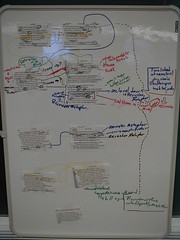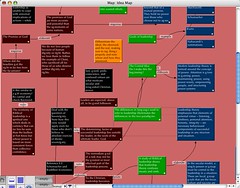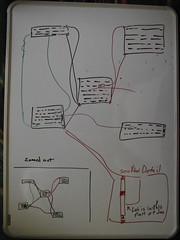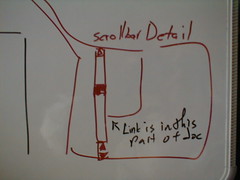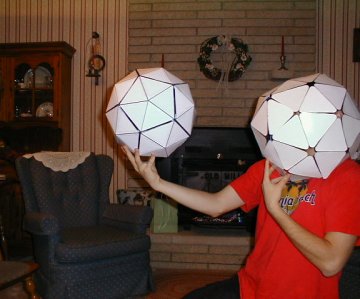• Contents
• Contact: jnm@rubberpaw.com
• Curriculum Vitae

• Recent Publications
• Recent Projects
• Conferences & Speaking
• (a)Musing (ad)Dictions:
Ideas. Tools. Art. Build --not buy. What works, what doesn't. Enjoy new media and software aesthetics at Tekka.
Theodore Gray (The Magic Black Box)
Faith, Life, Art, Academics. Sermons from my family away from home: Eden Chapel!
My other home: The Cambridge Union Society (in 2007, I designed our [Fresher's Guide])
The Economist daily news analysis
Global Higher Ed blog
• Hypertext/Writing
• Stats
Chapter I: Born. Lived. Died.
There is a Chapter II.
Locale: Lancaster County Pa, USA
Lineage: Guatemala
Religion: My faith is the primary focus of my life, influencing each part of me. I have been forgiven, cleansed, and empowered by Jesus Christ. Without him, I am a very thoughtful, competent idiot. With him, I am all I need to be, all I could ever hope for. I oppose institutional religious stagnation, but getting together with others is a good idea. God is real. Jesus Christ is his Son, and the Bible is true. Faith is not human effort. It's human choice. I try to be the most listening, understanding, and generous person I can.
Interests: Anything I can learn. Training and experience in new media, computer science, anglophone literature, education, parliamentary debate, democratic procedure, sculpture, and trumpet performance. Next: applied & computational linguistics, probably.
Education: Private school K-3. Home educated 4-12. Graduated Summa Cum Laude from Elizabethtown College in Jan 2006. As the 2006 Davies-Jackson Scholar, I studied English at St. John's College, Cambridge University from 2006 - 2008.
Memberships: Eden Baptist, Cambridge Union Society, ACM, AIP, GPA.
Alum of the Elizabethtown College Honors Program, sponsored by the Hershey Company.
|
August 2005
In which I Vlog. Fear me.
Wednesday, 31 Aug 2005 :-: ["Permalink"]
That's what I get for looking at the advertisements in the newspaper.
24 hours later, Dad and I were squinting in the schoolroom over a pile of circuitboard guts. We had removed the wires from my old serial Palm IIIc cradle and were carefully soldering on a set of wires from a new usb cable (Thanks Steve Wayde).
Some duct tape, glue, and a few Windows drivers, and I was ready. The boards and filters didn't disappoint. There it was in full glory. For a mere $25, I was able to turn the CVS single-time-use digital video camera into my very own non-disposable digital videocamera.
Thanks, i-Hacked! Now I know exactly what it feels like to be a script kiddie, doing technology things without any clue about what I'm doing.
So, in honor of this event, I present, "The adventures of Fresh and the Chef," part .01a-pr2.
Since this is my first try, and since I have nothing but Microsoft Movie Maker on the WinXP box, you get a DivX encoded mpeg whose audio may not work in Quicktime. Try Windows Media Player. The movie, which is 1 minute long, is 3 megs, so it may take some time to download over my DSL. Enjoy!
Breath
Monday, 29 Aug 2005 :-: ["Permalink"]
Have you ever been taken aback by the grace of God? I was singing a song this morning as I prepared to leave for the first day of classes (I perform two trumpet solos today; wish me luck!). As I described God's goodness in song, I couldn't help myself. I stopped breathing for a few moments in amazement.
The beauty of God's goodness is breathtaking.
And So it Comes
Monday, 29 Aug 2005 :-: ["Permalink"]
It will be a busy week. On Thursday, I leave on a trip for Austria. I will be presenting research at the 2005 ACM Conference on Hypertext and Hypermedia.
My presentation will be loosely related to the Philadelphia Fullerine. I'll post my presentation slideshow online once it is completed; I'm doing it as a hypertext in SVG. I also hope to post a travelogue online as the trip proceeds. I'll post the URL later.
The Egyptless Desert
Sunday, 21 Aug 2005 :-: ["Permalink"]
Along the same theme of my previous posts...this excerpt was found in a forgotten corner of an old bag I have not used for years. I remember writing this, but I do not remember when.
Dates, discussions, titles, and page numbers. Gone is the wonder, the mystery, the awe at seeing the soul of man bled carefully on thinly-bound volumes. No more do they rest invitingly, carefully placed between the shelves. I have winnowed the Riddle, and it has spilled out onto an itemized semester. The Sphinx has disappeared, and with it have vanished Giza, Hieropolis, the Lighthouse, and the cult of the sun.
An Egyptless desert.
And yet, even the Nile must slither into Africa.
Why? To escape the Mediterranean
Being Right
Saturday, 20 Aug 2005 :-: ["Permalink"]
Yesterday I wrote about the fear of being wrong. This often leads people to strongly defend ill-conceived ideas.
** * **
Perhaps an equal desire to be well-regarded also leads people to speak at the speed of thought. I have this tendency, which I wish to remove. If proofreading is necessary in writing, which is a slow, careful process, then some slight mental proofthinking would not be out of order.
College has caused this. Or rather, I have taken this on so I may succeed in college. Things proceed so quickly that it is difficult to be involved and think carefully. I have only one friend who truly took the time to think about things thoroughly. He, by necessity, remained largely silent during his college experience. Although he was, perhaps, the wiser student, he was not well regarded for it.
Being Wrong
Friday, 19 Aug 2005 :-: ["Permalink"]
Many people's dedication to the attainment of truth is much less than their fear of being considered wrong. This leads to no end of unusual personal conundrums.
I will try not to be one of those people.
On Theory-Based Approaches
Friday, 19 Aug 2005 :-: ["Permalink"]
As I have learned more about the study of literature, I have realized that there are many ways of looking at works of literature. For the last twenty years or so, the theory-based approach has prevailed. Scholars pick a topic, such as deconstruction, or politics, or gender issues, or psychology, or reader-response, or philosophy. Then, they only look at how the literature relates to that external or discipline.
This theory-based approach is useful. However, it allows us to be sloppy in two ways. First, by creating a list of external categories with which we can connect a poem, we can begin to see in literature what may not be there. Second, we risk the danger of substituting the task of comparison for the act of truly understanding. Such a theory-based approach makes us feel good. It can make us feel like we know something special about the poem that may not be obvious within the poem.
A theory-based approach may also, when combined with the need to publish, slip into the cult of the academic trend-du-jour.
On Higher Education and the Structure of Thought's Long-Term Progress
Friday, 19 Aug 2005 :-: ["Permalink"]
Have you noticed that the accumulation of information often changes the way you think? This happens in my brother, as his knowledge of Greek and Hebrew influences his speech patterns. It happens with me, as my understanding of hypertext influences me to think more in patterns and connections than in the past.
Have you noticed that higher education changes the sort of questions you ask? I recently noticed that I have moved from questions about the nature of life (which concern me directly) to more specific questions, which may not relate to personal life or to a quest to understand.
Notice the difference between posts on my current blog and my old site (compare). Ah, memories. One distinct one comes to mind -- it was my first large assignment, and I vividly remember reading Kafka's "Metamorphosis" late at night, on the couch in the living room at home, with one lamp on, and the yellow light and silent house adding the atmosphere of surreal nothingness to the reading experience. I was absorbed, enthralled, and entirely in love with the study of literature from then on.
I have lost the quest to really learn the deep things of the universe along the way. Have I just grown up, or have I betrayed my reason for reading?
I have done what I think is common in the generations of scholarly thought. I think this is a rule for history: Rather than supporting, refuting or responding to the old ideas of past scholars, the new generations of thinkers find new questions, and in doing so, think they are smarter than the previous generation, which did the same to their elders. This is what we in the humanities call "progress." We think it is bold to go new places where no mind has tread the gentle grass of our paradise ideas. In reality, it is rather cowardly, since we slink off to new ground and hope we don't have to admit defeat, all the while producing a new set of unanswerables for the next group to ignore.
** * **
I choose to lay aside the crust of years in the academic mindset, which sight-shortens us with little tasks so we never get to think of the big picture. I'm going back to a search for more than an interesting bit of theory, or something which makes a good paper, or helpful technique. I'm going back to digging for useful meaning.
Hold on tight. This process is not covered by the manufacturer's warrantee.
Post It
Friday, 19 Aug 2005 :-: ["Permalink"]
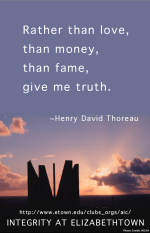 There seems to be a flurry of interest in my posters about Academic Integrity. As it turns out, I can print them at $1.10 per poster, which includes two dimes for Elizabethtown's Academic Integrity Committee. There seems to be a flurry of interest in my posters about Academic Integrity. As it turns out, I can print them at $1.10 per poster, which includes two dimes for Elizabethtown's Academic Integrity Committee.
Posters make a difference. Tuesday, as I prepared an important document for the college, I was slightly weary and disheartened. One of my own posters stared at me from the wall, and after I looked it in the face, I remembered why I do things. I found the strength to go on, and the day was a successful one.
infirmus mirabilis sublíme
Sunday, 14 Aug 2005 :-: ["Permalink"]
It is, I suppose, not altogether unlikely that one who has for so long exerted himself to the utmost of extremities of thought should now find himself in a weekened state. Indeed, while I find myself with no lack of worthy and urgent tasks, the motivation which usually possesses me seems to have carried on without me.
Which is just as well. I have a large choice in front of me, and I need the wisdom to act rightly more than the impetus to accomplish.
I have recently revisited Boswell's Life of Samuel Johnson.
Boswell was rather much a groupie in his attitude of Johnson, but that is OK. The book is worth reading, though not all at once. Interesting quotes.
(never finished this post, but useful anyway. I made my decision, which is yes. The college made their decision, which is yes. Now it's time to be motivated, and I am pleased to announce that the motivation is there)
Welcome, WITF Listeners
Saturday, 13 Aug 2005 :-: ["Permalink"]
My blog was mentioned on the American Public Media radio show Weekend America today. It featured discussion from the members of the Harrisburg Bloggers Meetup group (I have mentioned the group previously on this blog ).
Photos from the interview with Stu Kennedy can be found on my Flickr account.
Other bloggers in our group include:
If you want to get a feel for what blogs can be, these provide a good introduction. But I would suggest a few more blogs:
For more information about blogs, check out:
- If you want to start a blog, start by reading Mark Bernstein's marvelous "10 Tips on Writing the Living Web." This was the article that convinced me to start my own blog.
- Bloggers like to rehash the same conversation on "what is a blog anyway?" over and over, with very little agreement and many self-proclaimed experts. Get the encyclopedia definition of a blog, written by Jill Walker, who co-write the very first scholarly analysis of blogs with Torill Mortensen, whose blog I also like (posts like this are why).
- If you're interested in Electronic Literature, check out Grand Text Auto, a collection of posts from researchers electronic literature. The current discussion? An interactive play called Facade.
- If you want to start your own blog, you might want to get a free blog via LiveJournal or Blogger. If you need to host photos, try a Flickr account. I use an information tool called Tinderbox, which doesn't just handle my blog. I use it for nearly all my writing, information gathering, TODO lists, and brainstorming. The weblog quick-start tool will set up a blog for you. Editing and formatting a blog is much easier in Tinderbox than in the plaintext tools in Blogger and liveJournal. Even better, you don't need a blog-specific web host to publish your site. I reviewed Tinderbox for Sitepoint a year-and-a-half ago. For now, it's Mac OS X only, but a Windows version is coming soon. If you need a blog on Windows or don't want to pay for an information swiss-army-knife, I would suggest the free, Open Source tool Thingamablog. With Thingamablog, you can be blogging in minutes.
Happy Blogging!
** * **
Of course, if you're interested in my site, I would suggest that you read some of the archives, found at the top of this page, or look at some of the other parts of the site:
An interface idea for spatial hypertext
Saturday, 13 Aug 2005 :-: ["Permalink"]
For the last month, my whiteboard has been staring at me accusingly. Now I need it, so before wiping it clean, I need to describe an idea I have for spatial hypertext.
You may begin this post in a number of ways:
The Inspiration | The Theory | Relations to other software | The Idea Itself
** * **
How this came about
Last semester, I did extensive research on the flow of wit and rhetoric in the metaphysical poetry of Donne, Cowley, Crashaw, Herbert, and others. The test case for my theories doesn't even show up in the paper, because it would take too long (for my length requirements) to unravel using conventional text. But "On Hope," by Crashaw and Cowley, was the poem that opened it all up for me.
To properly study this poem, I needed a way to record links between bits of text. I also needed to show them. I had hoped to use Tinderbox, but it's difficult to link two specific bits of text to each other within a Tinderbox note. It can be done, but it's awkward and cannot be visualized very well. So I looked elsewhere. The closest matches were pieces of experimental hypertext software from the Xanadu project: a Udanax derivative called Abora and CosmicBook. After working with Abora for a time, it was clear that link-making is much less important to the software than version tracking. The link interface is very unintuitive. CosmicBook also turned up a dead end; there is no authoring tool.
I looked at Visual Knowledge Builder. But this, for my purposes, proved even less useful than Tinderbox.
I finally settled for a small whiteboard. In order to simulate my hypertext musings, I cut the poem into pieces, taped the pieces fo the whiteboard, and drew lines between them. This approach was very helpful.
My paper, which was submitted to the Norton Scholar's Prize (crosses fingers; although probability of a prize is low), uses the Dia flowchart software to demonstrate my ideas.
The Inspiration | The Theory | Relations to other software | The Idea Itself
** * **
A precursory note about theory
During the work for the paper I submitted to Hypertext 2005, I began thinking of the spatial hypertext map as a single hypertext space. This idea was encouraged by Shipman, Marshall, and Moran's research into implicit structure in Spatial Hypertext (which is why I am very grateful to the Visual Knowledge Builder/VIKI team for lots of cool ideas). I realized that Tinderbox aliases, which carry the same properties as regular text notes but keep unique location and links, are the spatial hypertext equivalent of transclusions. Of course, they are a very rough version of transclusions, if you think of the spatial document area as a collection of individual nodes. Since it's impossible to spatially transclude a portion of the note, the tool may seem to have few uses.
The idea of aliases as transclusions was not the central revelation here. Rather, the key change in my mind was the concept of the spatial map as a document space rather than a separate, flowchart view of document information.
Credit Where Credit is Due
This concept of the 2d spatial hypertext as a document space is not new. Jeff Raskin's ZoomWorld, Visual Knowledge Builder, and the Fenfire Project (screenshot) all share this concept. It can even be done in Tinderbox (as you see through this screenshot of a personal brainstorming session), though it's probably not an official feature:
Notice that my Tinderbox map is a similar equivalent to what I was doing on the whiteboard. Notice some of the limitations. For example, there is a limit to the amount of text you can place in a box, since it is the title. Notice also that notes can link only to other notes, not to text within other notes. This is because Tinderbox is displaying the titles, not the text, and because Tinderbox does not display the text of the note within the spatial view.
The Inspiration | The Theory | Relations to other software | The Idea Itself
The Idea
The idea is described in terms of Eastgate's Tinderbox, since it is the software with which I am most familiar. It would work somewhat like CosmicBook.
First, a shot of the whiteboard:
(note: Visual Knowledge Builder already displays the text of the note in the spatial map. However, it doesn't show link lines between the actual bits of text)
Each of these boxes displays the text of the note, and the size of the text display area is determined by the user-set size of the box on the screen. Thus, as the user zooms, more text can become visible (or the text could get bigger, depending on user setting, I suppose).
Personally, I would implement this feature as part of the Zoom in Tinderbox maps. Once you zoom to a certain level, it might make the text of the note visible. Alternately, a separate view might be used. The ability to see the fulltext of the note in a spatial view provides great usefulness when mind-mapping a set of ideas. One can do more than visually connect a set of titles; one can connect a set of texts.
Once you have implemented this, it becomes very useful to store and show the links properly. To do this well, Tinderbox would have to include selection->selection links. The linking interface would be simple. Highlight an area of text in one note. Then highlight an area of text in another note. Draw the link. Other interface issues could be solved using a link-selection system similar to Tinderbox's current dropdown that helps users work with overlapping links.
(random thought: the intelligent use of links and link types in Tinderbox is one of the least explored concepts, and unless I am mistaken, one of the most difficult to undertake without resorting to the XML)
Internally, this could be a problem. We run into the limitation of XML pretty quickly, since overlapping tags are not allowed. This is why Tinderbox stores links at the end of the Note's XML rather than using delimiting tags. In fact, it is this limitation of XML that makes Tinderbox's link-editing a little sketchy sometimes. But it can be done. Since Tinderbox works reasonably well with overlapping link origins, a similar solution may probably be devised for overlapping link targets.
Once you have implemented text-to-text links, you need a way of showing them. The previous diagram shows a way that visible text may connect to lines. This much is not a new idea. Simply connect the line to a highlighted portion, although I might suggest an outlined portion. Perhaps the link lines should not extend into the document until a key-combination is pressed or a preference set, since there are times when you don't want to give links undue visual importance. This would be similar to a current Tinderbox option in which command+option is used to show and activate a link if a certain option is set in the preferences.
Another type of link does not extend into the document text: links to text which is currently out of the viewing window. CosmicBook hides these. This is not a good idea. I had two ideas, both of which are shown in the previous figure. One idea is to show whether the link is to someplace previous or later in the document by drawing the line up to the top or bottom corner. This is a rough way to do it, but it would work.
The other way, shown here, draws a line to the part of the scrollbar where the linked text resides.
This latter approach creates a number of UI difficulties. While it shows the relative position of links outside of the current viewing, it can completely muddle the intelligible display of the relative position of lines that link to text within the viewing window. Links to active parts of the document could not link to a different side of the box, since that would be a nightmare of re-draws once the user started scrolling. Links to text inside of the viewing window would have to pass through the little scroll box that represents the current viewing window. This would make it difficult to distinguish the individual link lines if the active viewing window contained a large number of links.
What does this have to do with aliases?
If spatial hypertext were used, it would be simple and obvious to make text-to-text links from a note to itself. Since aliases retain their own set of links, it would be possible even to make several sets of text-to-text links within the same text. The editing code might be a bit tricky, but a great user interface problem would be solved. To visually show text-to-text links within the same text, merely bring an alias of the note alongside the main instance of the note (or another alias). The link lines would be drawn as if they were separate notes. Since aliases have their own unique set of links, there would be no problem with duplicate link lines. Lines would proceed from their origin to their destination.
Implementation
This is just a rough idea, and it would take careful frontend and backend brainstorming, testing, and other woodshedding to be turned into actual software. Eastgate is currently working on a Windows version and is facing new challenges with a codebase that uses different APIs for the canvas. Even if they were to like the idea, I don't know if this fine level of drawing control is available to them without considerable bits of extra code. It might not be possible outside of a more fundamental canvas system, or something like Flash and SVG. But I do think that these ideas may make a useful companion to spatial hypertext ideas and merge spatial hypertext with more traditional thinking on hypertext systems.
The variable issues in programming are so many and the idea so unconventional to basic canvas systems, I'm uncertain how long it would take to put something like this together. And there are other issues. For example, how would Tinderbox show containers in such a view (dimmed backgrounds showing boxes? Or switch between?)?
What do you think? Email me.
The Inspiration | The Theory | Relations to other software | The Idea Itself
Alas, Poor Yorick
Monday, 8 Aug 2005 :-: ["Permalink"]
This one's for all you literature geeks out there. I have been testing several ideas for making a portable version of my geodesic sculpture for presentation at Hypertext 2005. I have finally settled on a suitable architecture. Along the way, I have had some fun too :-).
Alas, poor Yorick! I knew him, Horatio: a fellow of infinite jest, of most excellent fancy: he hath borne me on his back a thousand times; and now, how abhorred in my imagination it is! my gorge rims at it. Here hung those lips that I have kissed I know not how oft. Where be your gibes now? your gambols? your songs? your flashes of merriment, that were wont to set the table on a roar? Not one now, to mock your own grinning?
Ars longa, vita brevis
Saturday, 6 Aug 2005 :-: ["Permalink"]
Very soon, I will be uploading an entirely new set of pages. But I will not be uploading them to this server:
Linux rubberpaw.com 2.4.16-586 #1 Wed Nov 28 08:21:15 EST 2001 i586 unknown
Rather, I will be uploading them to a new server, which will be properly hosted in a colocated facility. I'm looking forward to it.
Along with the new server goes a new domain: www.natematias.com. It points nowhere yet, but it will be a place with information about me in general. It will be an expanded form of Mark Bernstein's Personal Information Page idea. Here's a rough idea of what it will look like:
** * **
ars longa
One part of the site, linked from the word "wishmaker," will be subtitled, "identity via absence." The idea is to list all the things I have not done and wish someday to do. I got the idea from my wish to list all the things I wish someday to read. When devising the site, I realized that I could expand this list to include many other parts of life that I may never enjoy. It seems that a list like this could help people understand something about who I am. By writing things here, I hope also to alleviate my tendency to operate my life as a rush of interesting information and experiences. If I write them down, maybe I will be more content.
** * **
For example, this week on BBC7 was too good.There were simply too many interesting shows this week. I was able to listen to Dan Dare, Pilot of the Future, based off a 1950s comic strip (wow. Elton John did a Dan Dare song. Wow. I'm speechless. Link via Dan-Dare.net).
I also learned that Nick Hornby has a very boring voice. But I missed an interesting Agatha Christie mystery. I missed what sounds like a really sad love story, and I even missed the account of a hitchhiker in Ireland. There's even a six-part series about a Fansiscan monk-turned-sleuth.
** * **
Ah well. Life is short. This weekend, I build a geodesic sphere, set up a RAID-ed Linux box, write code to authenticate IIS 6 directories on LDAP queries, send a flurry of emails, perform the trumpet, meet an old friend, attend a gallery opening, begin preparing for GRE tests, begin preparing a screen presentation and maybe even sleep.
Hopefully, blogging will fit in there somewhere. I'm afraid that this level of craziness will be maintained for the next month or so.
Hang on tight! It's going to be a rough journey.
|





